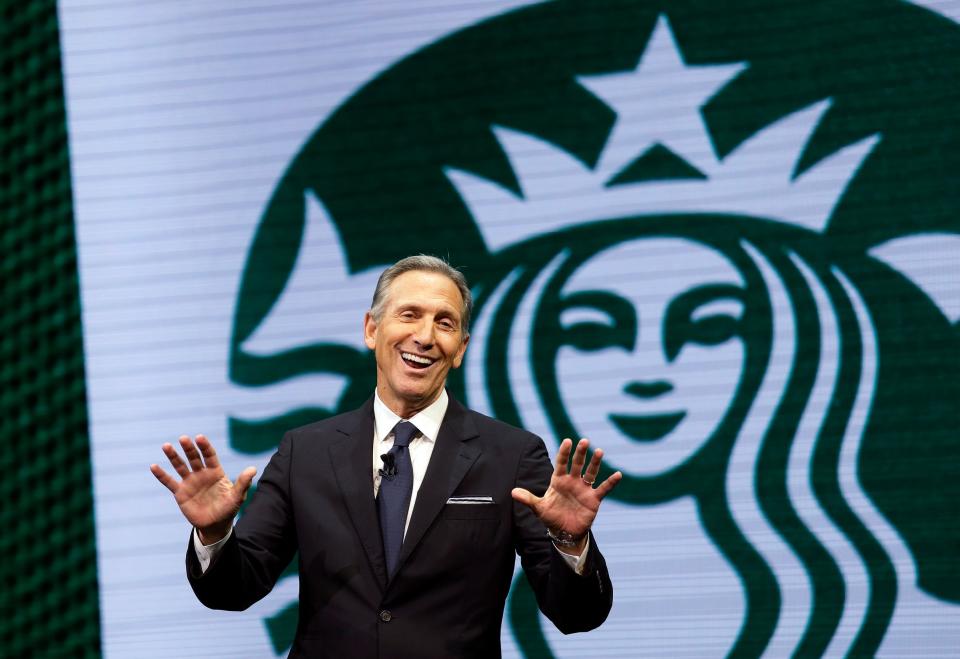Howard Schultz says he would oppose reparations, but suggests greater funding of HBCUs
Howard Schultz, the former Starbucks CEO mulling an independent run for president, says he doesn't support the idea of the government providing reparations to African Americans, a policy proposal gaining traction among some Democrats.
Rather, Schultz said, the federal government could invest more in other programs that would benefit minorities – including increased funding for historically black colleges.
"I would rather look forward than look back," Schultz said in an interview Sunday in Nashville. "And in looking forward, I think there are ways to address this issue. I would have a different view, and mine would be looking forward, not backwards, in how to invest significant support, dollars and programs within the African American community."
A number of Democratic presidential hopefuls have chimed in on the question of reparations – whether the government should in some way compensate descendants of slaves – and have expressed support for such an initiative.
Who is running for president in 2020?: An interactive guide

California Sen. Kamala Harris, Massachusetts Sen. Elizabeth Warren and former Housing and Urban Development Secretary Julian Castro are among those in recent weeks who have spoken favorably of the federal government implementing financial policies to reckon with racial injustices.
Schultz, formerly a longtime Democrat, has not previously spoken publicly on the topic of racial reparations, which he described as "a very complex question."
He was in Nashville for the Unrig Summit, a conference targeting millennials and focused on uniting the right and left to fight corruption in politics.
Rather than implementing a system to directly pay descendants of slaves in America, Schultz said he has considered the idea of increasing funding for Historically Black Colleges and Universities, which he describes as "under tremendous financial pressure."
"They do not get the philanthropic funding that other universities get," Schultz said. "And they serve a great, great purpose in America. One idea is to look at opportunities to fund those schools in ways that would be incremental to the current situation."
Schultz hasn't yet determined what an appropriate dollar amount might be for increasing funding for HBCUs.
"I don't know what the number is, but I think the idea has merit," Schultz said.
Schultz says the United States has a race problem
Schultz said the country "absolutely" has a problem with racism and injustice, and that the solution is to talk about the issue.
"The only way we're going to solve that problem is having honest conversations, some of which, at times, are uncomfortable – but having those conversations," Schultz said.
While featured at a CNN town hall event in February, Schultz drew criticism on social media for his comments about race after being asked about a 2018 racial profiling incident at a Philadelphia Starbucks.
"As somebody who grew up in a very diverse background as a young boy in the projects, I didn't see color as a young boy and I honestly don't see color now," Schultz said during that CNN event.
'Lifelong Republicans will come my way'
While Schultz announced in January he was interested in a bid for president as a "centrist independent," he said he likely won't announce whether he's entering the race until later this spring.
"Our democracy is being threatened, not only by a rigged system and a level of corruption, but a president who does not deserve to be in the Oval Office," Schultz said.
Despite being the subject of heckling from a handful of audience members, including some chanting, ironically, "billionaires for president," Schultz said he was "undeterred by the assault that has come" from those saying he will take away votes from the Democratic nominee and propel President Donald Trump into a second term.
"There are lifelong Republicans who, given a choice between Donald Trump and a Democrat, will more than likely vote for Donald Trump, despite how the character and morality of this president is inconsistent with their values," Schultz told Unrig attendees.
"If I choose to run, millions of lifelong Republicans will come my way."
Reach Natalie Allison at nallison@tennessean.com. Follow her on Twitter at @natalie_allison.
This article originally appeared on Nashville Tennessean: Howard Schultz says he would oppose reparations, but suggests greater funding of HBCUs

